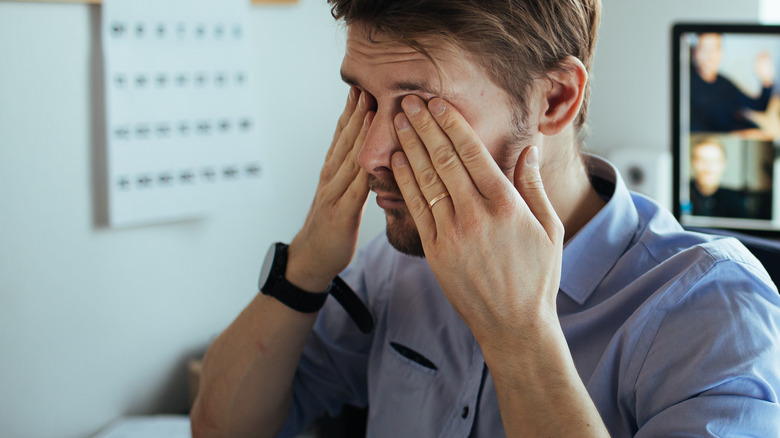You Might Need New Glasses If This Happens To You
Wouldn't it be wonderful to buy a pair of glasses and know for sure that it is the only pair that you will ever need? It would save so much time and money, but unfortunately, life often has different plans for us. Glasses can break and even if they do not, it is not uncommon for eyesight to worsen with age, to the point that your current pair of glasses may no longer be sufficient. According to For Eyes, people typically need to replace their glasses every one to three years, either due to vision loss or the glasses' frames wearing down.
Ideally, you should be seeing your eye doctor on a yearly basis to get a comprehensive exam. Your eye doctor may test your eye muscles, your vision, and your ability to see color, and then let you know whether it is time for you to get a new pair of glasses. But we already know that in certain circumstances, vision can take less than a year to deteriorate (per JAMA Ophthalmology), so how do you know if you need new glasses sometime in between your annual exams?
Headaches may be a sign you need a new pair of glasses
Of course, if your glasses are damaged, either get them fixed or get a new pair. There are other signs of needing new glasses that are equally unsurprising, including squinting, eye strain, eye fatigue, blurry vision from any distance, and frequent double vision. If you experience double vision regularly, you should see your eye doctor; if it turns out that you have crossed eyes, he or she may prescribe a pair of glasses with more prismatic power. This will help treat eye misalignment (per All About Vision).
On the other hand, you may be more surprised to learn that frequent headaches are another sign that you may need new glasses. According to Marano Eye Care, headaches are often among the first signs of vision change. Even if you are unable to detect a change in your vision, your brain is able to, and may overexert itself while trying to correct it, thereby causing a headache. Alternatively, you may be squinting without even realizing it, which can not only induce headaches but make your vision problems worse in the long run.
If you are farsighted and often develop headaches after spending time looking closely at things, or are nearsighted and often experience headaches above your eyebrow or in the front of your head, it may be time to see your eye doctor for an exam and possibly a new pair of glasses.


